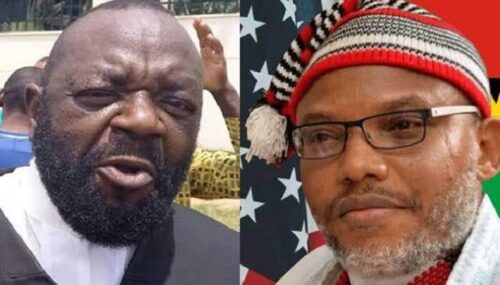Aloy Ejimakor, the Special Counsel to Nnamdi Kanu, leader of the Indigenous People of Biafra, IPOB, has revealed the next line of action following the Supreme Court ruling.
Ejimakor said Kanu’s legal team will move for a bail application for the IPOB leader at the Federal High Court in Abuja.
He spoke to newsmen shortly after the Supreme Court refused to order Kanu’s release.
In its judgment delivered by Justice Emmanuel Agim but written by Justice Garba Lawal, the Supreme Court overturned the Appeal Court ruling that discharged and acquitted Kanu of all terrorism charges in October 2022.
The Supreme Court held that although the Nigerian government recklessly and unlawfully rendered Kanu from Kenya, such an unlawful act has not divested any court from proceeding with trial.
Justice Lawal held that no Nigerian law was cited in the suit seeking Kanu’s release on mere unlawful abduction from Kenya.
The judge said at the moment, the remedy for such action is for Kanu to file a civil matter against such an act instead of removing the powers of courts to continue with his trial for alleged criminal charges.
The apex court subsequently ordered Kanu to defend himself in the remaining 7 counts of terrorism charges against him at the Federal High Court.
Reacting to the proceedings, Ejimakor said he was expecting the apex court to affirm the ruling of the Appeal Court.
According to Ejimakor: “I had high hopes that, based on the law of extradition, the Supreme Court should have affirmed the discharge order made by the Court of Appeal.
“Yes! First, we shall proceed with apace bail application to reinstate his bail in line with the ruling of the Supreme Court.”
Ejimakor also expressed dissatisfaction with the ruling of the Supreme Court on Kanu’s extraordinary rendition from Kenya.
He said: “I am not satisfied with the Supreme Court’s discountenance of the extraordinary rendition, because it does not comport with the doctrine of fair hearing.
“The Supreme Court justified its position on the theory that our jurisprudence has not developed to the point of recognizing extraordinary rendition as a barrier to prosecution. That is so wrong because it implies that Nigerian jurisprudence is primitive, behind the times and retrograde.”
-PM Newspaper
